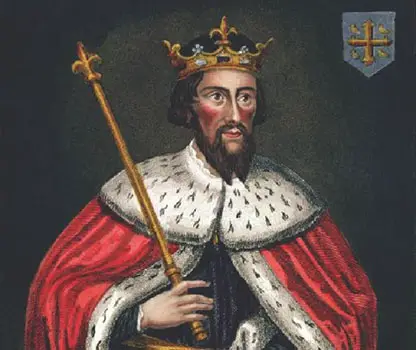Alfred The Great
Alfred the Great was the King of Wessex, an Anglo-Saxon kingdom in southwestern England. He is one of the only two English kings who were given the appellation ‘Great’. The other one is Scandinavian ruler Cnut the Great.
Alfred reigned from 871 till 899 AD. He is best known for foiling the Viking conquest of England and promoting literacy during his rule. His scholarly leanings are evident from the fact that he ordered compilation of Anglo-Saxon Chronicles, an early account of Anglo-Saxon and Norman England’s history in 890 AD. By the time his reign ended in 899 AD, Alfred had become the most dominant ruler in England.


Early Life: Alfred was born to King Ethelwulf of Wessex and his first wife Osburh in 849 AD. He was the youngest son of Ethelwulf and his eventual accession to the throne was not foreseen at the time of his birth as he had three elder brothers. Alfred was more interested in books from an early age. He also had health related issues that bothered him throughout his life. His mother was instrumental in introducing him to the scholarly pursuits.
However, he could not receive formal education till much later in life. His father arranged for him to be schooled in military arts, a norm during those days. While Alfred kept a low profile during the reign of his two eldest brothers, he came in public view during the reign of his brother Ethelred of Wessex and fought several important battles with him.

Alfred’s Reign: Well before Alfred’s accession to the throne, his elder brothers ruled briefly one by one. After the death of his elder brother Ethelred of Wessex, Alfred assumed the mantle. At the time he was arranging burial of his brother, Saxon army was being defeated by Danes. Alfred had to fight several skirmishes and battles against Danes and even had to pay them subsidy. Alfred was soundly defeated by the Vikings in 878 and he had to retreat.
However, with the passage of time he rallied support of people from Somerset, Wiltshire and Hampshire. He finally fought a decisive battle against Danes in 878 AD. His victory at Battle of Edington resulted in eventual surrender of The Viking Army at Chippenham. Although, the threat of Danish invasions largely diminished after this victory, Alfred still had to fight off many smaller Danish invasions. In 886 AD Alfred started the restoration of London to make it habitable again. He made his son-in-law Ethelred in-charge of London.
Alfred promoted education in his kingdom and provided patronage to arts. His reign remained peaceful thereafter till 890 AD, when large scale Danish invasions arrived again. Alfred is credited with administrative, legal and tax reforms. He also reorganized military to make it more effective.

Later Life and Death: Alfred was married to Ealhswith, a woman of Mercian nobility. Together they had five or six children. His son Edward the Elder succeeded him after his death. His eldest daughter married Ethelred, ruler of English Mercia. Alfred died on 26 October 899 AD. The exact cause of Alfred’s death is not known.
It is however; well known that he suffered from serious health issues throughout his life. Some historians believe that he suffered from an inflammatory bowel condition known has Crohn’s Disease. Alfred is viewed very favorably by the historians and is widely considered a Christian hero. To honor his services for promotion of education and literacy, a number of educational institutions have been named after him.
The University of Winchester was created from King Alfred College, Winchester. A town is also named after him in the state of New York, United States.




